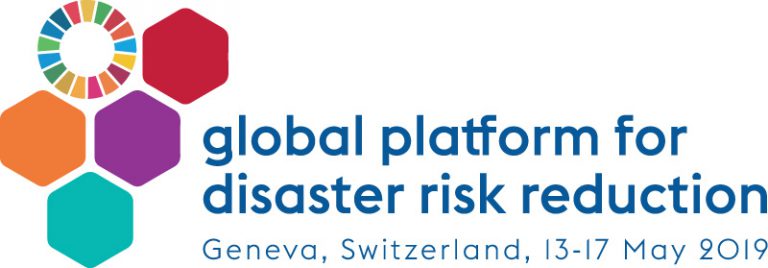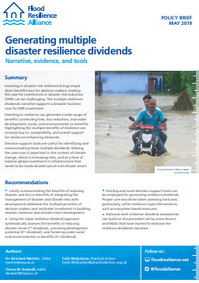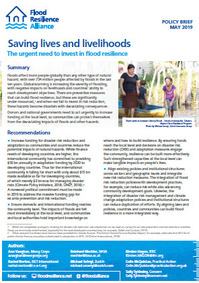Geneva, 13 to 17 May 2019
Why is the Global Platform important?
The Global Platform for Disaster Risk Reduction (DRR) takes place every two years. The platform is the foremost gathering for experts to explore how to reduce disaster risk and build the resilience of communities and nations.
The platform is convened by the UNDRR, the United Nations office for DRR, and this year was hosted by the government of Switzerland. More than 4,000 participants and delegates from over 180 countries are registered to attend the meeting. This is a rich and diverse group of actors that bridge the worlds of humanitarian aid and development, representing, indigenous communities, gender groups, the disabled, academia, research, the private sector and civil society organisations. Critically this Global Platform is the last opportunity to support governments to implement national and local disaster risk reduction strategies before they are due to report on these alongside reporting on progress to deliver the Sustainable Development Goals in 2020.

Why is the Zurich Flood Resilience Alliance attending?
The Zurich Flood Resilience Alliance will be attending the global platform with representatives from Mercy Corps, Zurich Insurance, Concern Worldwide, the International Institute for Applied Systems Analysis (IIASA), The International Federation of Red Cross and Red Crescent Societies (IFRC), Plan International and Practical Action, with technical specialists, practitioners, researchers as well as country representatives joining the meeting. The Alliance is taking advantage of this gathering at a moment when global attention is sensitised to the increased threat of flood loss and damage due to increasingly climate-supercharged extreme events such as Cyclones Idai and Kenneth in Southern Africa, to demonstrate our expertise in building the resilience of flood prone communities around the world and advance our objectives of influencing policy makers to increase ex ante disaster funding and improve resilience policies.
What are we asking for and how can we help?
The recent global assessment of disasters reports that “Overall, floods have affected more people than any other type of disaster in the 21st century, including in 2018”. It is also clear that in many cases these losses are avoidable if resilience building is implemented more effectively. The Alliance believes this needs to start at the community level and is about not just implementing flood mitigation measures but also empowering communities and individuals to make informed choices about the flood resilience options available to them. In recognition of this challenge the Alliance has developed the Flood Resilience Measurement for Communities (FRMC) framework, and is currently piloting this approach in flood prone communities in urban and rural locations in developing and developed countries around the world.
Our engagement
| Wednesday, 15th May 2019 10:00 to 12:00 Room 15 at the main venue |
The Alliance will be hosting a formal interactive session to demonstrate the FRMC, explain how the information generated helps communities improve their decision making and seek new partners to pilot the tool in practice. This main session will be backed up with further interactive sessions on Wednesday, Thursday and Friday at an Innovation Platform booth, where we will host drop-in sessions to demonstrate the FRMC and work with visitors to introduce the tool, seek their feedback, and invite them to pilot the tool in their own work. |
|
Friday, 17th May 2019 Working session 13 |
Ann Vaughan from Mercy Corps will be on a working panel in a session exploring the role of financial instruments in disaster risk management. |
| Friday, 17th 14:30 to 16:00 Working session 15 |
Practical Action will be active in the session on Multi-Hazard Early Warning Systems sharing our expertise from our Alliance work using the FRMC in Nepal and Peru. |
| Friday, 17th 16:00 to 16:30 German Innovation Booth |
Aparna Shrivastava from Mercy Corps will be giving a lightning talk on innovative financing sharing our experiences with the Alliance resilience bond work in Indonesia. |
Follow event on Twitter
Event account, handles and hashtags Follow the Zurich Flood Resilience Alliance Participating partner accounts and handle
- The need for governments and donors to shift focus away from post-event response into pre-event risk reduction, learn from previous events, and use available science to inform future risk. We recognise that after the flood event is before the next flood event;
- Resilience measurement – we cannot expect communities or individuals to build their resilience if they are unaware of the systemic strengths and weaknesses in their livelihoods and wellbeing. We have developed a resilience measurement framework and are “inviting others” to help us test this in diverse communities around the world;
- To respond to flood resilience, but leave a community or individual exposed to other risk is irresponsible. We therefore recognise the need for holistic approaches that build resilience. A community member doesn’t care if their resilience is being built to natural hazards or climate change, what they see is a threat that needs to be addressed. It is important that global organisations do not silo their responses. We need to make sure that efforts to reduce disaster risk under UNDRR are coherent with climate change action under the UNFCCC as well as complement national efforts to deliver on the Sustainable Development Goals;
- To build resilience we need to focus on the weakest links; it is the weakest links in the community around which the resilience of that community must be built. For this reason the Alliance prioritises actions to reach the most vulnerable and marginalised, putting those most affected at the centre of resilience action.



Comments